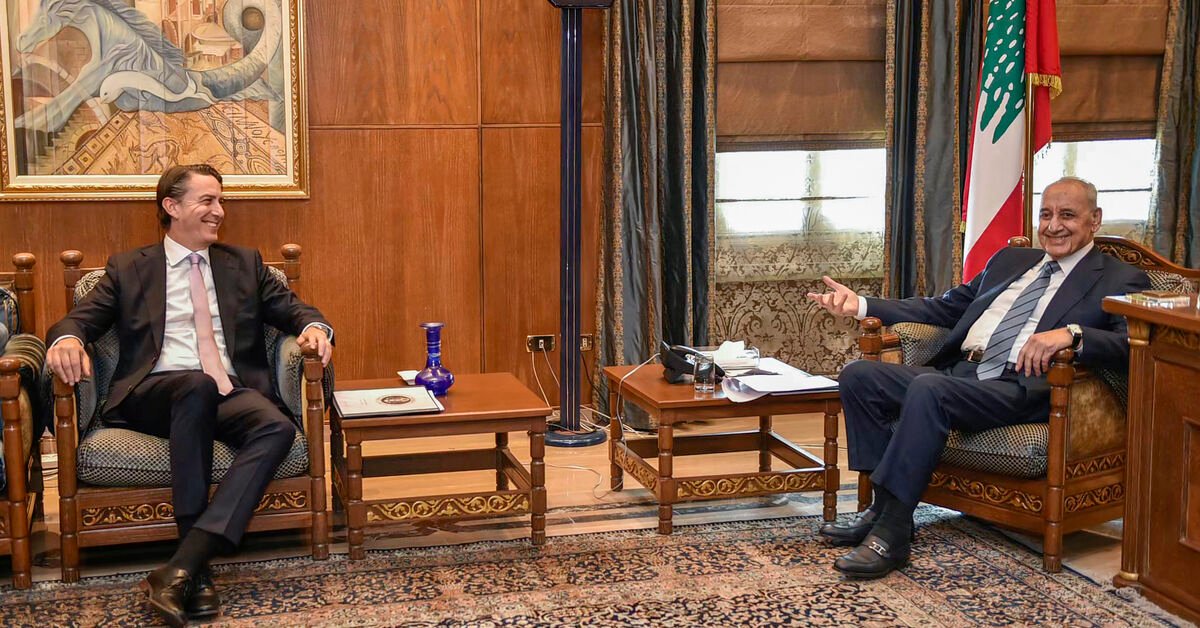BEIRUT — Hezbollah’s chief said Wednesday that the group had delivered its response to the US proposal for a cease-fire deal that would end the ongoing Israeli war in Lebanon, but cautioned that the ultimate decision rests with Israeli Prime Minister Benjamin Netanyahu.
“The cessation of fighting depends on the Israeli response and Netanyahu’s seriousness,” Hezbollah Secretary General Naim Qassem said in a televised speech on Wednesday. “If negotiations fail, we will continue to fight. We are capable and we will endure.”
In his third speech since assuming the leadership of the Iran-backed party last month, Qassem said the group has agreed to negotiate via parliament speaker Nabih Berri. He confirmed that Hezbollah received the new US proposal for a cease-fire, read it carefully and made some remarks that were submitted to US envoy Amos Hochstein.
“Let it be known that our negotiations are under the title of completely stopping the [Israeli] aggression and preserving Lebanese sovereignty,” he stressed.
Washington delivered a fresh proposal to Lebanese officials last week. Leaked information revealed that the new draft calls for the full implementation of UN Resolution 1701, which ended the 2006 war between Israel and Hezbollah, and the establishment of an international monitoring committee to ensure its implementation.
The new US proposal also stresses Israel’s undisputed right to intervene in Lebanon in case of resolution violations as well as the dismantlement of Hezbollah’s military infrastructure not only south of the Litani River but also in areas to its north.
Hezbollah entered the war on Oct. 8 of last year in solidarity with Gaza and the Palestinian militant group Hamas. Last month Israel launched an invasion into Lebanon aimed at halting Hezbollah rocket fire and allowing displaced residents to return to the north.
While Hezbollah has refused over the last year to decouple negotiations on Lebanon from Gaza, Qassem did not link the negotiations in Lebanon to a cease-fire with Hamas.
“We are honored to be among the few who support Gaza along with Iraq, Yemen and Iran while the whole world is watching. We were keen to provide support to Gaza, taking into consideration the circumstances in Lebanon,” Qassem said in his speech. “We led two battles: the first to support Gaza, and the second to repel the Israeli aggression on Lebanon.”
His speech coincided with Hochstein’s two-day visit to Beirut, where he met with Lebanese officials to push for a cease-fire deal with Israel.
Hochstein is expected to travel to Israel later on Wednesday and is scheduled to meet Netanyahu on Thursday.
On post-war Lebanon, Qassem mentioned three points that Hezbollah is willing to commit to. “We will efficiently offer our contribution to elect a president of the republic via parliament,” he said.
Of note, Lebanon has been without a president since October 2022 due to political bickering among the various rival forces in the country.
US push for cease-fire
Hochstein met with Berri to finalize details on a fresh US proposal for a truce.
In a brief statement to reporters after his meeting, Hochstein said that he made “additional progress” in his talks with Berri on Wednesday, adding that he will head to Israel in the next couple of hours in a bid to reach a final agreement.
He said he will not reveal details of the negotiations, as some parties he did not name may be disappointed.
After another meeting between the two on Tuesday, Hochstein said a deal was “within our grasp,” while Berri said the situation was “good in principle.”
The US envoy also held talks with Lebanese caretaker Prime Minister Najib Mikati and military chief Joseph Aoun as well as with Samir Geagea, the head of the Lebanese Forces, one of the largest Christian parties in Lebanon.
Several sticking points in the US deal remain between Israel and Hezbollah, including the members of the international committee that would be established under a potential deal and tasked with monitoring the implementation of UN Resolution 1701.
Iran-backed Hezbollah reportedly rejected Israel’s proposal that Germany and the United Kingdom be part of the committee. According to sources cited by the local LBCI station, the committee will consist of Lebanon, Israel, France, the United States and the UN peacekeeping force in Lebanon, UNIFIL.
Another hurdle is Israel’s insistence on the right to intervene inside Lebanese territory in case of violation of any deal — a clause that Lebanon considers a violation of its sovereignty. According to unnamed sources cited by LBCI, the new deal would grant both Lebanon and Israel the right to self-defense in case of attack from each other.
